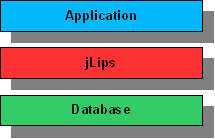
This is the homepage of jLips.
Jlips stands for Java Lightweight Interface Persistence System. It is a Java library, that is easy to use and provides a bridge between a Java application and a JDBC datasource.

It enables the application to manipulate the tables in the database through a set of interface files. These interface files contains methods to read and write the content of the fields in a database record. The application developer provides these interfaces and registers them with jLips. jLips will then provide the functionality to access the appropriate fields in the database.
jlips support access to fields and tables and access to relationships between tables, both one-to-one and one-to-many relationships.
Jlips is lightweight because it does not require complex configuration and setup files and it has a very small memory footprint (both the jar and the run-time memory requirements). It does however require a precise mapping between the method names in the interface files and the field names and the table names in the database.
Vision
The goal of jLips is to create component that can perform all the
database access functionality that an application might need and at
the same time keep the size of the component small.
A second goal is to strike a balance between the configuration
needed while at the same time not imposing strict design requirements
either on the database or the application.
Further to implement most of the "trivial" functionality needed by
the application to access the database.